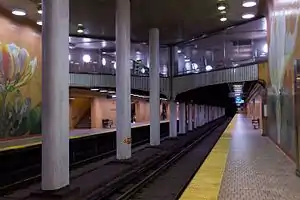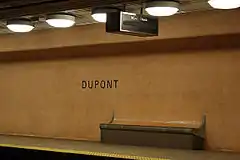Dupont station
Dupont is a subway station on Line 1 Yonge–University in Toronto, Ontario, Canada. It is located on Spadina Road at Dupont Street in The Annex neighbourhood of the city. Wi-Fi service is available at this station.[2]
 | |||||||||||
| Location | 263 Dupont Street Toronto, Ontario Canada | ||||||||||
| Coordinates | 43°40′29″N 79°24′25″W | ||||||||||
| Platforms | Side platforms | ||||||||||
| Tracks | 2 | ||||||||||
| Connections |
| ||||||||||
| Construction | |||||||||||
| Structure type | Underground | ||||||||||
| Disabled access | Yes | ||||||||||
| Architect | Dunlop-Farrow Architects | ||||||||||
| History | |||||||||||
| Opened | January 28, 1978 | ||||||||||
| Passengers | |||||||||||
| 2018[1] | 8,500 | ||||||||||
| Rank | 62 of 75 | ||||||||||
| Services | |||||||||||
| |||||||||||
History
The station opened in 1978, as part of the "Spadina" extension of the subway line from St. George to Wilson Station.
The 1995 Russell Hill subway accident happened on August 11, 1995, when a train southbound from St. Clair West station rear-ended another stationary train just north of Dupont station. Three people were killed and 30 were taken to hospital with injuries, and this section of the subway line was shut down for five days. Subsequent investigations found that a combination of human error and a design flaw in a mechanical safety device caused the accident.[3]
On June 1, 2006, at 9:30 a.m., as a train entered the station, a metal cover in the bottom of the last subway car came loose and wedged in the third rail. This filled the train with smoke, forcing the evacuation of the station and disrupting service for about an hour.[4] The possibility that this incident may have resulted from sabotage by striking TTC personnel was discarded by the Toronto Police.[5]
Three elevators and improved fare gates were constructed, to make the station accessible.[6] An open house was held on September 24, 2015 to outline the work involved.[7] The elevators opened on September 30, 2020.[8]
Architecture and art
Dupont Station was designed by Dunlop-Farrow Architects.[9] The two entrances to the station, located at the northwest and southeast corners of Dupont Street and Spadina Road, take the form of glass "bubbles" with orange-painted metal frames covering the stairways and escalators. A motif of rounded surfaces and finishes is used, with the interior walls of the station being clad in small circular orange tiles and all corners curved. On the platforms unique built-in concrete benches are also rounded and covered with the same tiles as the walls and the use of large circular lighting fixtures throughout the station reinforces the theme. The overall effect of the interior's rounded surfaces and colour scheme is of an earthly cavern.[10]
The main artwork in the station consists of murals designed by James Sutherland, entitled Spadina Summer Under All Seasons.[11] Using thousands of pieces of glass, colourful mosaics of flowers were created directly within the station's tiling. Two large mosaics of a giant flower in cross-section face each other across the tracks, reaching upward to a mezzanine level lined with smaller flower mosaics. Sculptor Ron Baird designed massive circular interlocking doors which provide access to the electrical substation, which is nestled behind the northwest entrance.[12]


Nearby landmarks
The station is located on the north side of The Annex neighbourhood. Nearby landmarks and destinations include Casa Loma, Spadina House, Casa Loma campus of George Brown College and the City of Toronto Archives.
Surface connections

A transfer is required to connect between the subway system and these surface routes:
TTC routes serving the station include:
| Route | Name | Additional Information |
|---|---|---|
| 26 | Dupont | Eastbound to St. George station and westbound to Jane station |
| 127 | Davenport | Eastbound to Spadina station and westbound to St. Clair Avenue West and Old Weston Road |
References
- "Subway ridership, 2018" (PDF). Toronto Transit Commission. Retrieved February 5, 2019.
This table shows the typical number of customer-trips made on each subway on an average weekday and the typical number of customers travelling to and from each station platform on an average weekday.
- "There's now free WiFi at over 40 TTC subway stations". blogTO. Retrieved December 21, 2016.
- Hall, Joseph (August 6, 2005). "Ten Years After". Toronto Star. Retrieved June 2, 2010.
- Staff reporter (June 1, 2006). "Mechanical failure leads to evacuation of Dupont subway station". CBC News. Retrieved June 26, 2009.
- "Dupont Station". MyTTC.ca. Retrieved June 26, 2009.
- "Dupont Station: Easier Access Program". TTC. Retrieved May 17, 2015.
- "Open House" (PDF). Dupont Station – Easier Access Project. TTC. September 24, 2015. Retrieved May 1, 2016.
- "Construction Notice: Dupont Station is accessible – Easier Access Project Update" (PDF). TTC. September 30, 2020. Archived from the original (PDF) on October 18, 2020. Retrieved October 18, 2020.
- "Dupont Subway Station". TO Built. Bob Krawczyk. 2008. Archived from the original on July 6, 2011. Retrieved June 26, 2009.
- Bow, James (April 24, 2008). "The Spadina Subway". Transit Toronto. Retrieved June 26, 2009.
- McIlveen, Eli (December 17, 2006). "Art on the TTC". Transit Toronto. Retrieved June 26, 2009.
- "Ron Baird: Dupont Subway Gate". Archived from the original on February 20, 2015. Retrieved August 10, 2012.
External links
![]() Media related to Dupont Station at Wikimedia Commons
Media related to Dupont Station at Wikimedia Commons